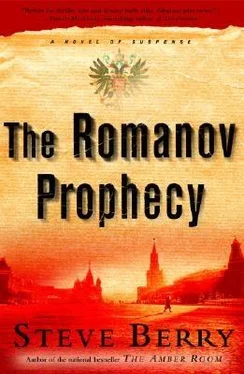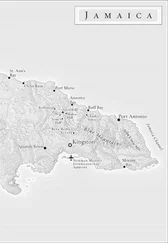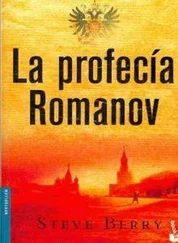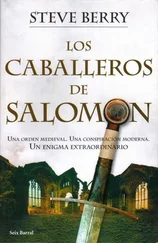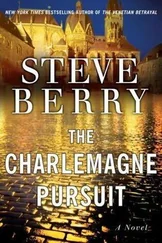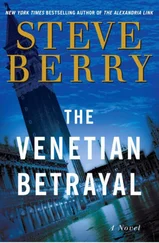Steve Berry - The Romanov Prophecy
Здесь есть возможность читать онлайн «Steve Berry - The Romanov Prophecy» весь текст электронной книги совершенно бесплатно (целиком полную версию без сокращений). В некоторых случаях можно слушать аудио, скачать через торрент в формате fb2 и присутствует краткое содержание. Жанр: Триллер, на английском языке. Описание произведения, (предисловие) а так же отзывы посетителей доступны на портале библиотеки ЛибКат.
- Название:The Romanov Prophecy
- Автор:
- Жанр:
- Год:неизвестен
- ISBN:нет данных
- Рейтинг книги:4 / 5. Голосов: 1
-
Избранное:Добавить в избранное
- Отзывы:
-
Ваша оценка:
- 80
- 1
- 2
- 3
- 4
- 5
The Romanov Prophecy: краткое содержание, описание и аннотация
Предлагаем к чтению аннотацию, описание, краткое содержание или предисловие (зависит от того, что написал сам автор книги «The Romanov Prophecy»). Если вы не нашли необходимую информацию о книге — напишите в комментариях, мы постараемся отыскать её.
The Romanov Prophecy — читать онлайн бесплатно полную книгу (весь текст) целиком
Ниже представлен текст книги, разбитый по страницам. Система сохранения места последней прочитанной страницы, позволяет с удобством читать онлайн бесплатно книгу «The Romanov Prophecy», без необходимости каждый раз заново искать на чём Вы остановились. Поставьте закладку, и сможете в любой момент перейти на страницу, на которой закончили чтение.
Интервал:
Закладка:
She acknowledged the compliment with a nod.
"Your father became involved with a Romanian national who was associated with the circus. She became pregnant, but returned home with the child. Your father tried to obtain an exit visa, but the authorities denied his requests. The communists were not in the habit of allowing their performers to leave. When he tried to leave without permission, he was detained and sent to a camp.
"Your mother remarried, but that marriage ended quickly in divorce. When she couldn't find a place to live after the second divorce-apartments were quite scarce, I remember well-she was forced to once again live with your father. By then, the authorities had decided to release him from the camp. So there, in that tiny apartment, the two of them languished in separate rooms until both died an early death. Quite a statement for our 'people's republic,' wouldn't you say?"
Akilina said nothing, but Lord could feel the pain radiating from her eyes.
"I lived with my grandmother in the country," she said to Pashenko, "so I didn't have to see my parents' torment. I didn't even talk with them the last three years. They died bitter, angry, and alone."
"Were you there when the Soviets took your grandmother away?" Pashenko asked.
She shook her head. "By then I had been placed in the special performers' school. I was told she died of old age. I only learned the truth later."
"You of all people should be a catalyst for change. Anything has to be better than what we had."
Lord felt for the woman sitting beside him. He wanted to assure her that things like that would never happen again. But that wouldn't be true. Instead, he asked, "Professor, do you know what's going on?"
A crease of concern laced the older man's face. "Yes, I do."
He waited for an explanation.
"Have you ever heard of the All-Russian Monarchist Assembly?" Semyon Pashenko asked.
Lord shook his head.
"I have," Akilina said. "They want to restore the tsar to power. After the Soviet fall, they used to hold big parties. I read about them in a magazine article."
He nodded. "They held big parties. Monstrous affairs with people dressed as nobles, Cossacks in tall hats, middle-age men in White Army uniforms. All designed to garner publicity, to keep the tsarist issue alive in the hearts and minds of the people. They were once thought fanatics. Now, not so."
"I doubt that group could be credited with the national referendum on restoration," Akilina said.
"I would not be so sure. There was far more to the assembly than met the eye."
"Could you get to the point, Professor?" Lord asked.
Pashenko sat in an almost unnatural pose that communicated no emotion. "Mr. Lord, do you recall the Holy Band?"
"A group of noblemen who pledged their lives for the tsar's safety. Inept and cowardly. Not one of them was around when a bomb killed Alexander II in 1881."
"A later group took that same name," Pashenko said. "But I assure you, it was not inept. Instead, it survived Lenin, Stalin, and the Second World War. In fact, it still exists today. The public division is the All-Russian Monarchist Assembly. But there is also a private portion, which I head."
Lord's gaze tightened on Pashenko. "And the purpose of this Holy Band?"
"The safety of the tsar."
"But there hasn't been a tsar since 1918."
"But there has."
"What are you taking about?"
Pashenko's fingers templed at his lips. "In Alexandra's letter and Lenin's note, you found what we have been missing. I must confess that until the other day, when I read those words, I harbored my own doubts. But now I am sure. An heir survived Yekaterinburg."
Lord shook his head. "You can't be serious, Professor."
"I am. My group was formed shortly after July 1918. My uncle and great uncle were both members of that Holy Band. I was recruited decades ago and have now risen to its leadership. Our purpose is to guard the secret and implement its terms at the appropriate time. But thanks to the communist purges, many of our members died. To ensure security, the Originator made sure no one knew all of the secret's terms. So a large part of the message vanished, including the starting point. You have now rediscovered that beginning."
"What do you mean?"
"Do you still have the copies?"
He grabbed his jacket and handed Pashenko the folded sheets.
Pashenko motioned. "Here, in Lenin's note. 'The situation with Yurovsky is troubling. I do not believe the reports filed from Yekaterinburg were entirely accurate, and the information concerning Felix Yussoupov corroborates that. The mention of Kolya Maks is interesting. I have heard this name before. The village of Starodug has likewise been noted by two other similarly persuaded White Guardsmen.' The information we lost was the name-Kolya Maks-and the village-Starodug. It is the starting point of the quest."
"What quest?" he asked.
"To find Alexie and Anastasia."
Lord sat back in the chair. He was tired, but what this man was saying sent his mind reeling.
Pashenko went on, "When the royal Romanov bodies were finally exhumed in 1991 and later identified, we positively learned that two may have survived the massacre. The remains of Anastasia and Alexie have never been found to this day."
"Yurovsky claimed to have burned them separately," he said.
"What would you have claimed if you had been ordered to kill the imperial family and were two bodies short? You would lie because, otherwise, you would be shot for incompetence. Yurovsky told Moscow what they wanted to hear. But there are enough reports that have surfaced since the Soviet fall to cast great doubt on Yurovsky's declaration."
Pashenko was right. Affidavits gathered from Red Guardsmen and other participants attested that not everyone may have died that July night. Accounts varied from the bayoneting of moaning grand duchesses to the stabbing and rifle-butting of hysterical victims. There were many contradictions. But he also recalled the snippet of testimony he found, apparently from one of the Yekaterinburg guards, dated three months after the murders.
But I realized what was coming. The talk of their fate was clear. Yurovsky made sure we all understood the task at hand. After a while, I started saying to myself that something should be done to let them escape.
He pointed to the papers. "There's another sheet there, Professor. From one of the guards. I didn't show you. You may want to read it."
Pashenko shuffled through and read.
"This is consistent with other testimony," Pashenko said when he finished. "Great sympathy developed for the imperial family. Many of the guards hated them, stole what they could, but others felt differently. The Originator made use of that sympathy."
"Who is the Originator?" Akilina asked.
"Felix Yussoupov."
Lord was shocked. "The man who killed Rasputin?"
"The same." Pashenko shifted in the chair. "My father and uncle told me a story once. Something that happened at the Alexander Palace, in Tsarskoe Selo. It was passed down through the Holy Band, from the Originator himself. The date of the event is October 28, 1916."
Lord motioned to the letter Pashenko held. "That's the same date of that letter from Alexandra to Nicholas."
"Precisely. Alexie had suffered another hemophilic bout. The empress sent for Rasputin, and he came and eased the boy's suffering. Afterward, Alexandra broke down, and the starets berated her for not believing in both God and him. It was then that Rasputin prophesied that the one with most guilt would see the error of his way and assure that the blood of the imperial family resurrected itself. He also said only a raven and an eagle could succeed where all fail-"
"-and that the innocence of beasts will guard and lead the way, being the final arbitor of success," Lord said.
Читать дальшеИнтервал:
Закладка:
Похожие книги на «The Romanov Prophecy»
Представляем Вашему вниманию похожие книги на «The Romanov Prophecy» списком для выбора. Мы отобрали схожую по названию и смыслу литературу в надежде предоставить читателям больше вариантов отыскать новые, интересные, ещё непрочитанные произведения.
Обсуждение, отзывы о книге «The Romanov Prophecy» и просто собственные мнения читателей. Оставьте ваши комментарии, напишите, что Вы думаете о произведении, его смысле или главных героях. Укажите что конкретно понравилось, а что нет, и почему Вы так считаете.
